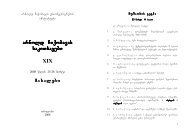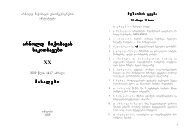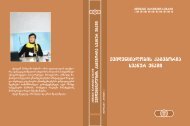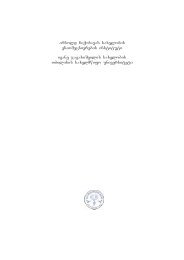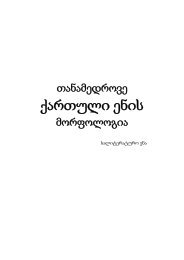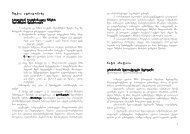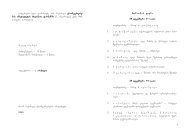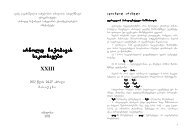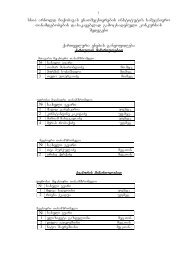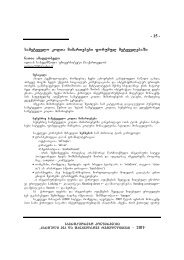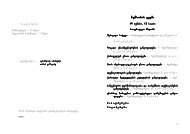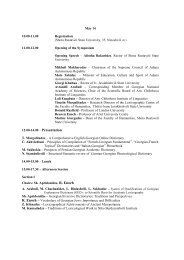5 r. a b a S i a (Tbilisi) bgeraTSesatyvisobis erTi rigisaTvis qarTvelur ...
5 r. a b a S i a (Tbilisi) bgeraTSesatyvisobis erTi rigisaTvis qarTvelur ...
5 r. a b a S i a (Tbilisi) bgeraTSesatyvisobis erTi rigisaTvis qarTvelur ...
Create successful ePaper yourself
Turn your PDF publications into a flip-book with our unique Google optimized e-Paper software.
ment of Daghestan, trade-and-economic relations with different centers of the<br />
Russian empire.<br />
We can state that after joining of Daghestan to Russia, especially after the<br />
Great October revolution in 1917, the influence of oriental languages on<br />
Daghestanian languages had sharply weakened due to strong expansion of Russian.<br />
Since, Lezgian terminology began to develop and orientated mostly on<br />
Russian tradition, though there still remained traditions of old Arabic vocabulary,<br />
which were strong enough for some more time. Earlier borrowings from<br />
Russian into Lezghian, reflecting spheres of social interaction of the speakers in<br />
the above-mentioned languages, related to the vocabulary of administration, governing,<br />
war, culture, etc. Different social and cultural changes, alteration of governing<br />
style and living standards of Lezgians had brought to life new terms,<br />
which demanded new names.<br />
А. В а г а п о в (Грозный)<br />
К происхождению названий некоторых животных<br />
в чеченском языке<br />
Buož ‘козёл-вожак’ (инг. buog, ц.-туш. b'ok'). Восходит к пранах.<br />
*bag (ср. чеч. мн. bežaloj < bažiloj), имеющему соответствия в кавказ.<br />
(каб. bžen ‘коза’, адыг. bž’e ‘рог’, дарг. bek’, лак. bak’ ‘голова, главарь,<br />
вожак’) и и.-e. языках: др.-исл. bokkr, др.-в.-нем. boc, др.-ирл. boc, перс.<br />
boz ‘козёл’ < и.-е. *bog- ‘крутой, с изогнутыми рогами’. Возможно, сюда<br />
же относится и сван. pik’w ‘кастрированный козёл’ (< *bik’w < *bak’w).<br />
Родственно чеч. buoža ‘мужчина’, мн. buožarij, buožaber ‘мальчик’, таб.<br />
baž ‘мальчик’, мн. bažar, лит. buože ‘голова, горб’, buožis ‘головастый<br />
человек’.<br />
Buorš ‘бычок’ (инг. buorš, ц.-туш. borš, мн. baršuj). Соответствует<br />
др.-инд. vrşa- ‘бык’, vrşan ‘самец’, varşati ‘дождить’, авест. varešna<br />
‘cамец’, лат. *versеs ‘вепрь’, лит. veršis ‘телёнок’, лтш. versis ‘бык’.<br />
Исходная форма восст-ся в виде barš ‘оплодотворяющий’, ср. род. baršan,<br />
мн. beršaloj < barshiloj, jett barše beana ‘корова в течке’, buoršalla<br />
162



